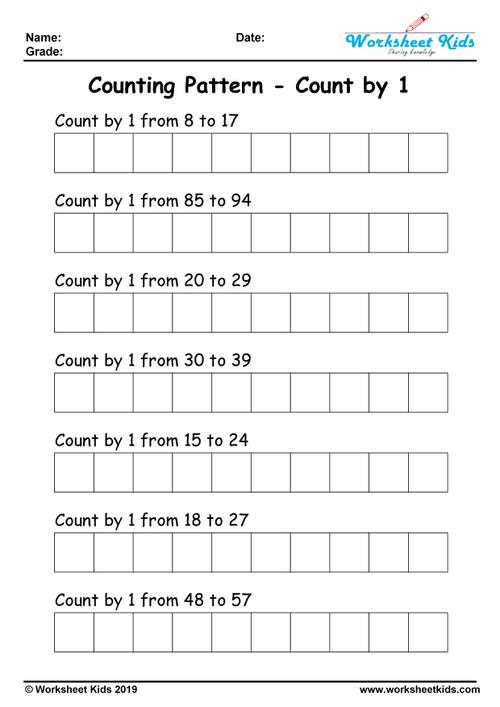First Grade Skip Counting Adventures
Imagine a first grader, eyes alight with excitement, hopping across a colorful number line, calling out multiples of two. This isn't just playtime; it's a powerful learning experience. Skip counting, the practice of counting by intervals other than one, forms a crucial foundation for future mathematical concepts. This seemingly simple skill opens doors to multiplication, division, understanding number patterns, and even musical rhythms. Engaging first graders in skip counting activities sets them on a path toward mathematical fluency and confidence.
From the earliest days of formal education, educators have recognized the importance of establishing strong number sense. While the precise origins of skip counting games are difficult to pinpoint, their enduring presence in classrooms worldwide speaks volumes about their effectiveness. These games, often passed down through generations of teachers and parents, represent a time-tested method for making math accessible and enjoyable. They bridge the gap between abstract numerical concepts and concrete, real-world experiences.
One of the main challenges in teaching first-grade skip counting lies in maintaining student engagement. Young learners thrive on interactive, multi-sensory activities. Simply reciting numbers can quickly become monotonous. The key is to incorporate movement, visual aids, and playful competition to keep children motivated and actively involved in the learning process. By transforming skip counting practice into a game, educators can tap into children's natural curiosity and desire for fun.
Skip counting, in its simplest form, involves counting by a number other than one. For example, counting by twos (2, 4, 6, 8…), fives (5, 10, 15, 20…), or tens (10, 20, 30, 40…). These patterns form the basis for understanding multiplication as repeated addition. For instance, counting by twos five times leads to the same result as 2 multiplied by 5. A simple example could involve a child hopping along a number line marked with multiples of five. Each hop reinforces the pattern and visually represents the concept.
The benefits of introducing skip counting games in first grade are numerous. Firstly, these activities build a strong foundation for multiplication and division. By recognizing and internalizing number patterns, children develop an intuitive understanding of these more complex operations. Secondly, skip counting improves number sense. Children learn to visualize numbers and their relationships to each other, strengthening their overall mathematical reasoning. Lastly, skip counting games enhance memory and concentration. The playful nature of the activities helps children focus and retain information more effectively.
Creating a successful skip counting action plan involves incorporating a variety of activities. Use number lines, hundred charts, and manipulatives like counters or blocks. Integrate movement by having children hop, clap, or jump while counting. Introduce songs and rhymes that reinforce skip counting patterns. For example, singing “Five, ten, fifteen, twenty…” to a familiar tune can make learning fun and memorable.
Successful examples include using a hundred chart to find multiples of ten, playing a beanbag toss game where children skip count to determine their score, or creating a skip counting hopscotch board. Incorporate stories and real-world scenarios like counting coins or grouping objects.
Advantages and Disadvantages of Skip Counting Games
| Advantages | Disadvantages |
|---|---|
| Engaging and Fun | Can be distracting if not managed well |
| Reinforces Number Sense | May not cater to all learning styles |
| Prepares for Multiplication and Division | Requires preparation and resources |
Best practices include keeping activities short and focused, providing plenty of positive reinforcement, differentiating instruction to meet individual needs, incorporating visual aids, and connecting skip counting to real-world scenarios.
Challenges may include students struggling with specific skip counting sequences, maintaining focus during activities, or transferring the skill to other mathematical contexts. Solutions include providing individualized support, breaking down tasks into smaller steps, using multi-sensory materials, and connecting skip counting to other math concepts.
FAQs: What is skip counting? Why is it important? How can I help my child practice at home? What games can we play? What resources are available online? How can I make it fun? How do I assess my child's progress? What if my child struggles?
Tips and Tricks: Use music and rhymes, create a skip counting scavenger hunt, use dice to determine the skip counting interval, and celebrate successes to keep motivation high.
In conclusion, skip counting games provide a vibrant and effective pathway for first graders to explore the world of numbers. These activities build a strong foundation for future math skills, enhance number sense, improve memory, and most importantly, make learning fun. By incorporating creative and engaging games, educators and parents can empower children to embrace mathematical concepts with confidence and enthusiasm. The journey begins with a simple skip, a hop, and a count, but the destination is a future filled with mathematical understanding and proficiency. Start exploring the numerous resources available online and offline, adapt them to suit your child's individual learning style, and watch them embark on an exciting mathematical adventure. Embrace the playful power of skip counting, and witness the remarkable growth in your child's mathematical abilities.
Elevating port charlotte living with transformative murphy beds
Unleash the rage decoding robloxs angry face emotes
Decoding skip heitzigs age a deep dive














